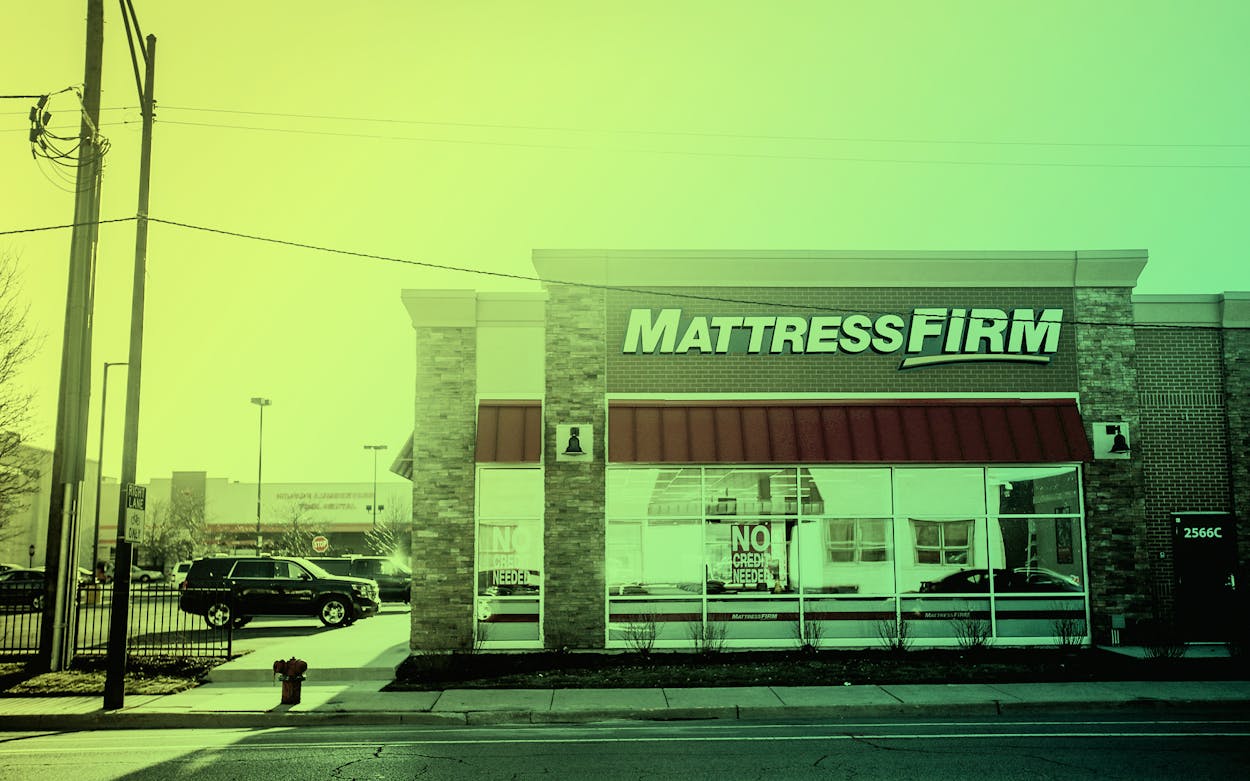In one Austin neighborhood, there are six Mattress Firms within a square mile of one another. In the company’s hometown of Houston, there are four locations on Westheimer between Bagby and Shepherd alone. In Mesquite, you can pick whichever side of I-635 you like at Town East Boulevard and get to a Mattress Firm within minutes. Out in the West Texas town of El Paso, you can fall in love with some memory foam at either the Cielo Vista Shopping Center, or go literally next door at The Fountains at Farah. Sleepy Valley residents can buy a new mattress at Tenth and Trenton, or if they don’t think they can make it that far north, they can make the less-than-two-mile drive down to Nolana and get a new bed there. There are 37 Mattress Firms in Austin alone—by comparison, the city has 43 Starbucks.
Mattresses aren’t a frivolous impulse buy—few people stroll by a store and decide to treat themselves to a new $1000 memory foam on a whim. Yet since 2010, Mattress Firm has opened more than 1,500 new locations across the country. So, what’s with all of these mattress stores?
A lawsuit filed in Harris County by Mattress Firm against Alexander Deitch, vice president of Colliers International, and two former real estate executives, Bruce Levy and Ryan Vinson, offers a potential explanation. As commercial real estate website Bisnow explains, the company alleges that expansion was fradulent:
Mattress Firm claims Levy, Vinson, Deitch and a group of developers conspired to push Mattress Firm into more, and more expensive, locations as it grew to operate its current portfolio of more than 3,500 stores.
Mattress Firm alleges the cohort was responsible for leases signed for above-market prices, then conspired to sell the properties where the company’s new locations opened for substantial profits. It claims Deitch and Levy secretly owned stakes with the developers that owned some of the properties, and used their control of Mattress Firm’s real estate decisions to profit personally from the sales. Mattress Firm’s internal investigation uncovered the alleged fraudulent activities, it said, and it fired the two executives last year.
Drawing the line between fraud and aggressive expansion is at the heart of Mattress Firm’s lawsuit. The lawsuit claims one portion of the scheme alone — a $50K broker fee per lease — could have cost the retailer at least $40M in excess payments. That accounts for roughly 800 locations.
This comes at a time of unrest in the mattress industry. In 2015, Texas Monthly‘s John Nova Lomax took a look at Mattress Firm’s growth as web-based direct-to-consumer retailers like Casper made their own push into the mattress space. As more online retailers emerge, the competition has only grown more fierce over the past two years. There are high margins—a $3,000 mattress costs around $300 to make—but retailers, both online and in physical stores, are selling a commodity often bought once a decade like it’s a luxury good.
It makes for a cutthroat industry—one with its fair share of lawsuits. In addition to Mattress Firm suing its former executives and online retailers suing online reviewers, the company filed a suit against Tuft & Needle, one of the many direct-to-consumer web retailers, in October. That suit alleged that ads from Tuft & Needle targeting “greedy” mattress stores and describing those retailers as a “scam” (and which use variations on the Mattress Firm logo) were defamatory and diluted the company’s trademarks. This week, Tuft & Needle fired back, threatening a countersuit and arguing that its ads were commentary and parody, which are protected by the First Amendment.
Apparently, mattress retail is an industry where competitors have to sleep with one eye open. But if reading about the feuds has left you exhausted, there’s a lot of locations where you can get yourself a new bed to sleep it all off.








